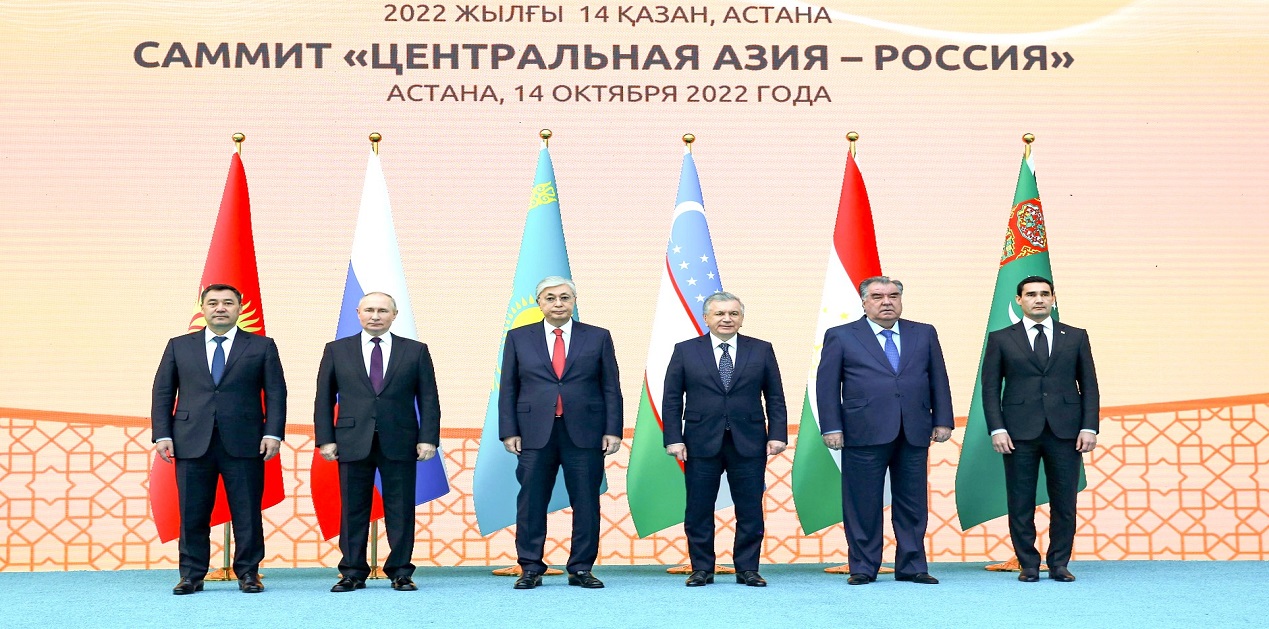Background
During the ongoing Ukrainian crisis, Russia’s relations with its near abroad, namely the Central Asian region, have been put to test. Central Asian Republics (CARs) have maintained a middle-ground approach, neither opposing nor supporting Russia’s actions in Ukraine. However, the geopolitical and economic ramifications of the Russia-Ukraine crisis have had a significant influence on the Central Asian region. Supply chain disruption, labour migration challenges, and the inflow of Russians into Central Asian territory are just a few of the issues that required immediate attention from Moscow and its Central Asian allies to resolve.
Against this backdrop, Russian President Putin attended the first-ever Leaders’ Summit with Central Asian counterparts on October 14, 2022, in Astana. President of Kazakhstan Kassym-Jomart Tokayev hosted the summit, which was attended by Presidents of Uzbekistan Shavkat Mirziyoyev, Kyrgyzstan Sadyr Japarov, Tajikistan Emomali Rahmon, and Turkmenistan Serdar Berdimuhamedow. The summit’s agenda revolved around adopting measures to safeguard joint trade and economic interests in the present geopolitical climate and regional security challenges.[1] All the leaders presented their views on the regional situation and their relations with Moscow. Following the summit, a joint statement was issued.
Since the outbreak of the Ukrainian crisis, several narratives have been created in an attempt to dismantle Russia’s relations with Central Asian nations. It’s also possible that Moscow’s indifference (due to its own challenges) to regional issues of the post-Soviet space has reduced Russia’s influence in Central Asia. However, given the long-standing historical links between Moscow and the CARs, as reiterated by Kazakh President Tokayev’s speech at the recently held Summit, Russia-Central Asia relations have the potential to be reinvigorated. He underlined that “at this difficult stage of world history, it is more important than ever for us to have a clear and positive image of the future. Our countries are destined to be together. We must protect our shared history and create a unified future for the well-being of our people. Stability and security in each country directly influence the region’s development”. [2] However, to achieve this, there is a need to develop effective tools to prevent emerging threats and respond to them proactively.
President Putin, underlining his commitment to the Central Asian region, stated that there are already mechanisms for regular engagement between them but that the new format (Russia-Central Asia Summit) would supplement the current lines of communication. [3] Accusing outside forces of impeding the development of Russian-Asian cooperation and disrupting long-standing cooperation in politics, economics, and humanitarian aid, Russian President Vladimir Putin called for coordinated steps to strengthen alliances and strategic partnerships, as well as to increase economic stability.[4]
Despite all the anti-Russian rhetoric in Central Asia following the Ukrainian crisis, trade data indicates that Moscow’s relations with these countries are going well, at least in economic terms. Russia’s trade with these countries has grown to USD 37.1 billion in the last five years. Furthermore, Russian trade with Central Asia surged by 16% in the first six months of 2022.[5] The numbers presented by President Putin indicate a significant economic relationship between the two areas. However, there is still considerable skepticism on the Central Asian side about Russian trade and investment.
During the Summit, Tajik President Emomali Rahmon voiced his displeasure with Russia’s neglect of the Central Asian region. President Putin was the target of criticism. Tajikistan’s President has asked Russia for more respect and investment. The video of Tajik President criticising Russia went viral, and a slew of thoughts surfaced regarding Russia’s waning influence. The commentators pointed out that Central Asian countries are staging a protest against Moscow.[6] However, this needs to be taken through a slightly different approach. Instead of requesting that Putin end his regional interference, President Rahmon called for an increased Russian commitment to Central Asia. It should be interpreted in a manner that Central Asian nations have this kind of relationship with Russia that they can simply express their discontent as well. This might also be viewed as a chance for Russia to concentrate on improving its ties with the region.
A few things which the Russian President highlighted to strengthen its relations with Central Asia are as follows-
Reconfiguration of Financial Systems - To overcome the sanctions’ impact, financial restructuring with the help of its Central Asian partners has already begun. This will eliminate the dependence on Western corporations. Instead of the SWIFT system, which is located in Belgium and is dominated by the dollar, President Putin emphasised that steps had been taken to transition to well-established Russian financial message transmission systems similar to the national systems of Central Asian nations.[7]
Unified Energy System- Despite having abundant domestic energy resources, Central Asia’s energy supply is unequally divided across urban and rural areas. Most people in Central Asia reside in rural regions, where there is a shortage of modern energy services to satisfy basic necessities. The region’s energy sector was centrally regulated throughout the Soviet era, but after the dissolution of the Soviet Union and the emergence of autonomous republics, there was an energy crisis. At this Summit, Putin offered his assistance in re-establishing the unified Central Asian energy system in order to address this problem. According to him, “in the area of energy security, Russia and the five Central Asian nations are working more closely together. And Russia is prepared to offer helpful support in re-establishing Central Asia’s unified energy system, which would undoubtedly improve the energy security of all the region’s countries”.[8]
Transport Corridors - The Russia-Ukraine conflict has had a significant implication on supply chains which has not only affected Russia but also nearly all other nations. Central Asian nations have suffered greatly as a result of their heavy reliance on transit through Russia. To meet this challenge and reposition Russia's exports and imports, the development of transport corridors throughout Greater Eurasia needs to be accelerated. In this regard, the Russian President emphasised that the major goal is to establish new trans-Eurasian corridors that run across Central Asian nations’ territories: north-south, east-west, and Europe-Western China. However, existing infrastructure (INSTC and Chabahar) already exists for linking North and South, and Moscow and New Delhi have recently pushed for it. Central Asian countries must play a proactive role in utilising and developing existing transportation corridors.
Regional Security - The Russian President also stressed mutual security issues, such as the situation in Afghanistan. He again blamed the Western intelligence services, particularly American and British, for mobilizing anti-Taliban organisations with the goal of shelling the borders of neighbouring nations of Afghanistan (Tajikistan, Turkmenistan, and Uzbekistan share a border with Afghanistan and recently, there have been reports of rocket shelling from Afghan side to these countries). Russia faces comparable risks to Central Asia, so Moscow maintains appropriate cooperation with the Taliban movement’s leadership. While individual negotiations with the Taliban government must continue, joint strategy and cooperation are also necessary for Afghanistan, according to the Russian President.
Conclusion
The first Summit between Russia and Central Asia is especially important at this time when multiple propagandist campaigns are harming Moscow’s relations with Central Asian nations. All the rhetoric has been put on hold which is a reflection of Russia’s strong historical and cultural ties to the region. But as the President of Tajikistan emphasised, Russia shouldn’t ignore the region’s issues and aspirations. But to maintain its influence, Russia needs to make concentrated efforts to help these nations politically as well as economically.
Endnotes
[1]Devonshire-Ellis, “CIS Heads Of State, and Russia-Central Asia Forum Meetings In Astana: Analysis & Opinion”, Russia Briefing, October 17, 2022. https://www.russia-briefing.com/news/cis-heads-of-state-and-russia-central-asia-forum-meetings-in-astana-analysis-opinion.html/
[2]Dana Omirgazy,“Tokayev Focuses on Regional Security and Stability at Central Asia – Russia Summit”, The Astana times, 14 October 2022.https://astanatimes.com/2022/10/tokayev-focuses-on-regional-security-and-stability-at-central-asia-russia-summit/
[3] “Russia–Central Asia Summit”, the Kremlin, October 14, 2022. http://en.kremlin.ru/events/president/news/69598
[4]Elena Teslova, “Putin says 'complicated' world affairs prompting Russia, Central Asia to intensify cooperation”, Anadolu Agency, October 14, 2022.https://www.aa.com.tr/en/politics/putin-says-complicated-world-affairs-prompting-russia-central-asia-to-intensify-cooperation/2711902
[5] “Russia–Central Asia Summit”, the Kremlin, October 14, 2022. http://en.kremlin.ru/events/president/news/69598
[6]Armen Mirzoyan, “Tajik President Criticizes Putin for Continuing Soviet "Non-Respect" Policy towards Central Asia” October 15, 2022.https://hetq.am/en/article/149317
[7] “Russia–Central Asia Summit”, the Kremlin, October 14, 2022. http://en.kremlin.ru/events/president/news/69598
[8]Ibid.
(The paper is the author’s individual scholastic articulation. The author certifies that the article/paper is original in content, unpublished and it has not been submitted for publication/web upload elsewhere, and that the facts and figures quoted are duly referenced, as needed, and are believed to be correct). (The paper does not necessarily represent the organisational stance... More >>
Image Source: http://static.kremlin.ru/media/events/photos/big2x/EuqJpARL3yJS7ZJuEhbD3tRV54DUg0mM.jpg











Post new comment